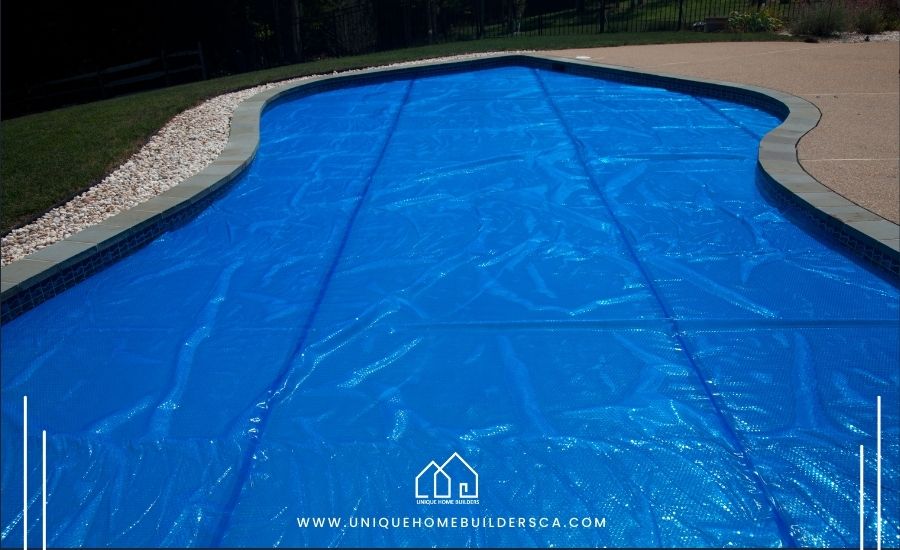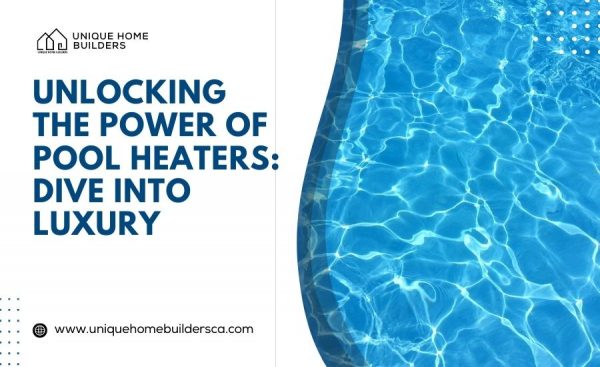If you’re a pool owner, you know that there’s nothing quite like taking a refreshing dip on a hot summer day. However, when the weather starts to cool down, your pool can become too chilly for comfortable swimming. That’s where pool heaters come in. These incredible devices allow you to unlock the power of warmth, extending your swimming season and providing luxurious comfort year-round. In this article, we will explore the world of pool heaters, their benefits, the different types available, factors to consider when choosing one, and essential maintenance tips.

Understanding Pool Heaters
Pool heaters are devices designed to heat the water in your pool to a desired temperature. They work by using a heat source, such as electricity, gas, or solar energy, to warm the water as it circulates through the system. By controlling the temperature, pool heaters provide a comfortable swimming environment, enabling you to make the most of your pool investment.
Different Types of Pool Heaters
When it comes to pool heaters, there are several options available, each with its own advantages and considerations:
- Electric Pool Heaters
Electric pool heaters are powered by electricity and are known for their efficiency and ease of use. They are suitable for pools of all sizes and can quickly heat the water. However, they tend to have higher operating costs compared to other types.
- Gas Pool Heaters
Gas pool heaters use either natural gas or propane as their fuel source. They heat the water rapidly and are effective even in colder climates. Gas heaters are often more affordable to operate than electric ones, but they require access to a gas line or propane tank.
- Solar Pool Heaters
Solar pool heaters harness the energy of the sun to heat the water. They are environmentally friendly and cost-effective in the long run since they rely on renewable energy. Solar heaters work best in areas with abundant sunlight and can extend your swimming season without increasing your utility bills.
Benefits of Using a Pool Heater
Adding a pool heater to your swimming pool offers numerous benefits:
- Extended Swimming Season
With a pool heater, you can enjoy your pool earlier in the spring and later into the fall. By maintaining a comfortable water temperature, you can extend your swimming season, making the most of your investment and creating lasting memories with family and friends.
- Increased Comfort
No one wants to dip into freezing water. A pool heater ensures that your pool is at an ideal temperature, providing a comfortable and inviting atmosphere for swimming and relaxation.
- Health and Well-being
Swimming is not only a fun activity but also a great way to stay active and improve your overall well-being. With a pool heater, you can maintain a comfortable water temperature that promotes relaxation, relieves stress, and allows for low-impact exercise. Regular swimming sessions can enhance cardiovascular health, muscle strength, and flexibility.
- Versatility for All Ages
A heated pool accommodates swimmers of all ages, from children to the elderly. It provides a safe and enjoyable environment for kids to learn how to swim and play in the water. For seniors, warm water can alleviate joint and muscle pain, offering therapeutic benefits and promoting better mobility.
- Entertaining and Relaxing
A heated pool opens up a world of entertainment possibilities. Whether you’re hosting a pool party or enjoying a quiet evening swim, a comfortable water temperature sets the stage for unforgettable moments. Relaxing in a warm pool under the stars creates a tranquil ambiance and allows you to unwind after a long day.
Factors to Consider When Choosing a Pool Heater
When selecting a pool heater, it’s important to consider the following factors:
- Pool Size and Volume
The size and volume of your pool play a crucial role in determining the appropriate heater size. Larger pools require more powerful heaters to efficiently heat the water, while smaller pools may require less heating capacity.
- Climate and Location
The climate and location of your area influence the choice of pool heater. If you live in a region with mild temperatures, a solar pool heater may be sufficient. In colder climates, a gas or electric heater with a higher heating capacity may be necessary.
- Energy Efficiency
Opting for an energy-efficient pool heater can help reduce operating costs and minimize environmental impact. Look for heaters with high energy efficiency ratings and features such as programmable timers and thermostats for better control over energy usage.
- Installation and Maintenance
Consider the installation requirements and maintenance needs of different pool heaters. Some heaters may require professional installation, while others can be easily set up. Additionally, regular maintenance is essential to ensure optimal performance and longevity of the heater.
Installation and Maintenance of Pool Heaters
Proper installation and maintenance are crucial for the efficient operation of your pool heater. Here are some key points to keep in mind:
- Professional Installation
For complex or gas-powered pool heaters, it’s advisable to hire a professional for installation. They will ensure that the heater is installed correctly, adhering to safety standards and local regulations.
- Regular Cleaning and Inspection
Clean the pool heater regularly to remove debris, leaves, and other obstructions that can affect its performance. Additionally, schedule annual inspections to identify any potential issues and address them promptly.
- Water Chemistry Maintenance
Maintaining proper water chemistry is essential for the longevity of your pool heater. Monitor and balance the water’s pH, alkalinity, and sanitizer levels to prevent corrosion and damage to the heater.
- Winterization
If you live in an area with freezing temperatures, it’s crucial to winterize your pool heater. Drain the water from the heater and ensure all components are protected from freezing to avoid costly repairs.
Energy Efficiency and Cost Savings
Energy efficiency is an important consideration when choosing a pool heater. Here are some tips to maximize energy efficiency and save on operating costs:
- Use a Pool Cover
Using a pool cover when the pool is not in use helps retain heat and prevent evaporation, reducing the workload on the heater. It can significantly decrease heat loss and save energy costs in the long run.
- Optimize Heating Schedule
Set your pool heater to run during off-peak hours when energy rates are lower. Additionally, using a programmable thermostat allows you to regulate the temperature based on usage patterns, ensuring efficient energy consumption.
- Maintain Proper Water Temperature
While it’s tempting to crank up the heat, keeping the pool at a slightly lower temperature can result in substantial energy savings. Aim for a comfortable temperature rather than excessive warmth.
- Invest in Energy-Efficient Equipment
When replacing or upgrading your pool heater, opt for models with high energy efficiency ratings. Energy-efficient heaters are designed to provide optimal performance while minimizing energy consumption and operating costs.
- Consider Solar Pool Heaters
Solar pool heaters utilize renewable energy from the sun, making them an environmentally friendly and cost-effective option in the long run. While the initial investment may be higher, the savings on energy bills can offset the cost over time.
Pool Heater Safety Precautions
While pool heaters offer many benefits, it’s crucial to prioritize safety. Here are some essential safety precautions to follow:
- Proper Ventilation
Gas-powered pool heaters require proper ventilation to prevent the accumulation of harmful gases, such as carbon monoxide. Ensure that the heater is installed in a well-ventilated area and regularly inspect the ventilation system for any blockages.
- Regular Inspections
Schedule regular inspections of your pool heater to identify and address any potential safety issues. Look for signs of wear and tear, leaks, or unusual odors, and promptly contact a professional if you notice anything concerning.
- Compliance with Safety Standards
Ensure that your pool heater complies with all safety standards and regulations. This includes electrical wiring, gas connections, and overall equipment safety. If in doubt, consult a licensed professional for guidance.
- Proper Use and Supervision
Always follow the manufacturer’s instructions for the safe operation of your pool heater. Never leave children unattended in or around the pool, and ensure that everyone using the pool is aware of basic water safety rules.
Extended Swimming Season with a Pool Heater
One of the most significant advantages of a pool heater is the ability to extend your swimming season. By maintaining a comfortable water temperature, you can enjoy your pool for longer periods, even when the weather starts to cool down. Imagine hosting pool parties in the early spring or taking a relaxing evening swim in the crisp fall air. A pool heater allows you to make the most of your pool investment and create lasting memories with family and friends.

Conclusion
Unlocking the power of pool heaters opens up a world of luxury and comfort for pool owners. By providing warmth and extending the swimming season, these devices enhance the overall pool experience. Whether you choose an electric, gas, or solar heater, careful consideration of factors such as pool size, climate, and energy efficiency will help you make the right choice. Remember to prioritize safety, proper installation, and regular maintenance to ensure optimal performance and longevity of your pool heater.
For professional pool installation in Encino, CA, call Unique Home Builders at (805)724-7408.
FAQs
How long does it take for a pool heater to heat up the water?
The heating time for a pool depends on various factors, including the size of the pool, the desired temperature increase, and the heater’s capacity. On average, it can take anywhere from a few hours to a day to heat the water to the desired temperature. It’s important to note that larger pools or pools with high-temperature differentials may take longer to heat.
Can I use a pool heater for both in-ground and above-ground pools?
Yes, pool heaters are suitable for both in-ground and above-ground pools. However, it’s essential to choose a heater that is appropriate for the size and specific requirements of your pool. Consult with a professional or refer to the manufacturer’s guidelines to ensure compatibility.
Are pool heaters expensive to operate?
The operating costs of a pool heater can vary depending on factors such as the type of heater, local energy rates, and usage patterns. Electric heaters may have higher operating costs compared to gas or solar heaters.
Can I install a pool heater myself, or do I need professional assistance?
The complexity of installation depends on the type of pool heater and your level of expertise. It’s recommended to consult with a qualified technician or installer to determine the best course of action for your specific situation.
Can I use a pool heater as a hot tub heater?
While pool heaters and hot tub heaters serve a similar purpose, they have different specifications and requirements. Pool heaters are designed to heat a larger volume of water, while hot tub heaters are specifically tailored for smaller capacities and rapid heating.




Comments: